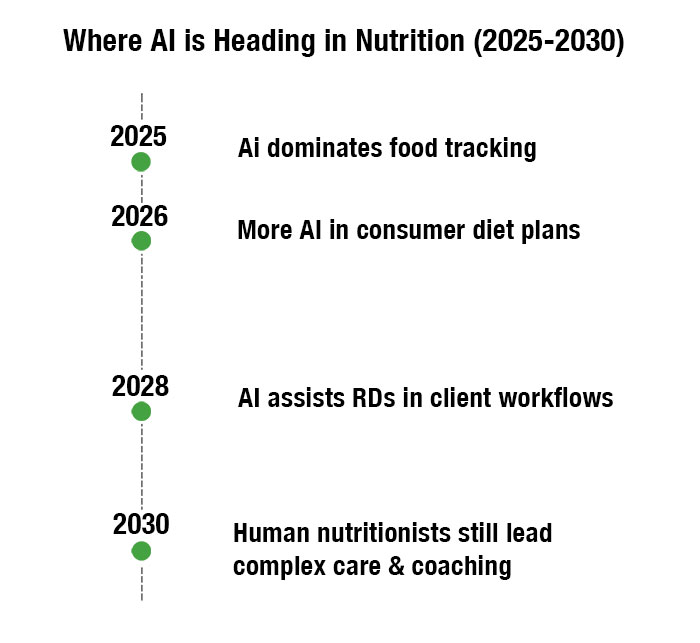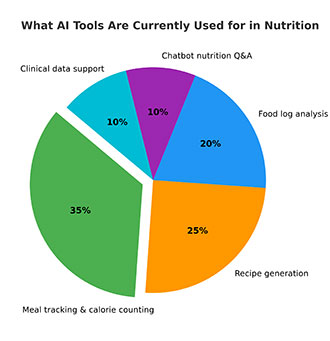As artificial intelligence (AI) keeps advancing, it’s natural to wonder how it might impact jobs — especially in health and wellness fields like nutrition. Lately, we’ve seen more AI-powered tools, apps, and even chatbots giving dietary advice. So it begs the question: Could they replace actual nutritionists one day?
Let’s talk about it — and more importantly, how you can future-proof your career in nutrition.
AI in Nutrition: What’s Actually Happening?
AI has definitely made some waves in nutrition. There are apps that track food intake, recommend meals, and even analyze health data. Tools like this can be helpful, especially when it comes to speed and automation.
But here’s the thing: most AI tools today are supportive, not substitutive. They’re great at crunching numbers or offering generic suggestions, but they’re not equipped to handle the human side of nutrition — the coaching, trust, motivation, and connection that actually help people make real changes.
Why Human Nutritionists Aren’t Going Anywhere
Even the smartest chatbot doesn’t know what it’s like to sit across from a client who’s struggling with emotional eating, or trying to lose weight after pregnancy, or juggling diabetes with cultural food traditions. That’s where you come in.

Here’s what sets real nutritionists apart:
• Empathy & encouragement – AI can’t offer a warm smile or motivational boost when someone’s feeling stuck.
• Personalized care – You can take into account someone’s medical history, culture, lifestyle, and goals in a way that no algorithm can.
• Trust & safety – A certified professional will always be more reliable when it comes to tailoring safe and ethical nutrition advice.
What the Experts Are Saying
Professionals across the board agree that AI is a tool — not a replacement.
“Dietitians who work with AI tools will be the ones who thrive. You might spend less time building food logs and more time counseling clients.” – Reddit user in r/dietetics
“AI’s swift and intelligent solutions supplement our human capabilities… the indispensable human element in our work remains.” – Dietitians On Demand
In a Quora thread discussing whether dietitians could be replaced, most responses pointed to the limits of AI — especially when it comes to behavioral coaching, trust, and adapting to personal situations.
How to Future-Proof Your Nutrition Career
Instead of seeing AI as competition, think of it as something you can leverage. Here are a few ways to stay ahead:
1. Use AI to streamline (not replace) your workflow – Let tech help you with data tracking, meal templates, or client follow-ups — so you can spend more time actually connecting with people.
2. Keep learning – Stay updated on both nutrition science and the technology shaping your field. Platforms like Nutrition Talent and FutureLearn have great insights.
3. Hone your soft skills – The better you are at listening, empathizing, and motivating, the more valuable you become — AI just can’t compete with that.
4. Find your niche – Specialize in something AI tools can’t do well, like intuitive eating, pediatric nutrition, or working with complex conditions.
What Can AI Actually Do in Nutrition Today?
AI has come a long way in recent years, and there’s no doubt it can help both professionals and everyday users in some powerful ways. From simplifying tasks to analyzing data at lightning speed, AI tools are becoming common in nutrition apps, wearables, and even online health platforms.
Here are a few things AI can do really well right now:

Meal Planning & Tracking
AI-powered apps like MyFitnessPal, Cronometer, or even newer tools like Foodvisor use image recognition and nutrient databases to help users log meals, calculate macros, and hit dietary targets.
Recipe Suggestions
Based on dietary preferences (vegan, keto, gluten-free, etc.) and ingredient availability, AI can suggest recipes in seconds. Some apps even adjust portion sizes and nutrition profiles automatically.
Basic Nutrition Advice
Chatbots or virtual assistants can provide general info about healthy eating, recommended daily intakes, hydration, or common nutrient deficiencies — especially for those looking for quick answers.
Analyzing Food Logs
AI can spot patterns in someone’s diet, such as excessive sugar intake or nutrient gaps, and offer suggestions. Some tools go a step further by linking this data to fitness goals or lab results.
Supporting Clinicians with Data
For RDs and healthcare providers, AI can streamline charting, generate reports, and even flag potential nutrient interactions — saving time for more meaningful client interactions.
Real Client Needs That AI Still Can’t Handle
This is where the human touch shines. While AI can deliver information, it can’t understand people — not in the deep, emotional, and nuanced way that real nutritionists and dietitians can.
Here are just a few things AI tools still struggle (or outright fail) to do:
Emotional Eating & Mindset Coaching
Helping someone break a binge-eating cycle, navigate guilt around food, or repair their relationship with eating requires empathy, trust, and often trauma-informed care. AI lacks emotional intelligence and nuance here.
Personal and Cultural Sensitivities
Food isn’t just fuel — it’s part of identity, tradition, and family. A chatbot can’t grasp the complexities of cultural food choices or how holidays, religion, and social life affect eating habits.
Motivation & Accountability
A real nutritionist can cheer a client on, read their body language, and adjust tone and goals to fit that person’s energy. AI can’t check in with genuine concern or celebrate milestones in a meaningful way.
Navigating Complex Health Conditions
People with PCOS, IBS, food allergies, autoimmune disorders, or a combination of conditions often need layered, individualized strategies. AI might suggest conflicting advice or oversimplify serious issues.
Building Trust
Trust is everything in nutrition counseling. Clients need to feel heard, seen, and supported — and that kind of relationship is something only a human can build.
“AI can offer answers, but not understanding. It can make suggestions, but not decisions. And most importantly, it can’t make a person feel seen or supported.”
Helpful Resources
• Using Generative AI as a Nutrition Professional – Nutrition Talent
• Can a Dietitian Be Replaced by AI? – Quora Thread
• Digital Health and AI in Healthcare – Free FutureLearn Course
References
1. Academy of Nutrition and Dietetics – “Artificial Intelligence in Nutrition and Dietetics: A Review”
A foundational article exploring how AI is currently being used in dietetics and what future developments may look like.
2. National Library of Medicine (NIH PubMed Central) – “Artificial Intelligence and Dietetics: Perspectives and Ethical Considerations”
https://www.ncbi.nlm.nih.gov/pmc/articles/PMC11243505
Peer-reviewed and detailed look at the role of AI in healthcare with a specific focus on nutrition applications.
3. Dietitians On Demand – “The Intersection of AI and Dietetics: A New Paradigm in Nutrition”
A practical and forward-thinking overview of how AI can support, not replace, dietitians in clinical and private practice.
https://dietitiansondemand.com/the-intersection-of-ai-and-dietetics-a-new-paradigm-in-nutrition/






